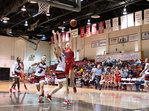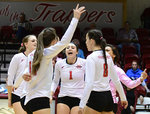Cloudy, 30° F
Concerns about the heavy coaching turnover at Northwest College over the past two years came to head this month, when a tearful volleyball player took her frustrations to the college’s board of …
This item is available in full to subscribers.
The Powell Tribune has expanded its online content. To continue reading, you will need to either log in to your subscriber account, or purchase a subscription.
If you are a current print subscriber, you can set up a free web account by clicking here.
If you already have a web account, but need to reset it, you can do so by clicking here.
If you would like to purchase a subscription click here.
Please log in to continue |
|



Concerns about the heavy coaching turnover at Northwest College over the past two years came to head this month, when a tearful volleyball player took her frustrations to the college’s board of trustees.
NWC sophomore Jess Ruffing addressed the board during the citizen’s open forum portion of the board’s monthly meeting in early February. A native of Mountain Home, Idaho, and two-year member of the Lady Trappers volleyball team, the young athlete chose her words carefully.
“I’m representing the volleyball team as a whole, and it gets me so emotional, because I care so much about this program,” Ruffing told the board. “I’m graduating … and as I leave, I’m seeing it go to crap. Committees here promised so many things, and this is my second year of not having a coach, basically, for the spring season.”
After a long period of extremely low turnover among NWC’s coaching ranks, the volleyball program will enter next season with its third coach in as many years, while the men’s and women’s soccer teams are searching for their fourth coach in four years.
Of the seven head coaching positions at NWC, five are currently being advertised.
“The perception from the community is that the college doesn’t care about sports and the athletes. That’s at least what it looks like,” Ruffing said in a follow-up interview. “There’s so much turnover — interim coaches and everything — so I just wanted to share my perception, coming from a fellow athlete, and how it feels on the other end.”
It’s an impression that NWC President Stefani Hicswa says she and her staff are working diligently to dispel.
“It is unfortunate the situation we’re in with our coaches, and we’re doing the best we can to get them replaced,” Hicswa said. “Athletics is an important part of what we do at Northwest College.”
Toward that end, the college made a major change earlier this month, lowering the academic requirements for coaches in an effort to attract a larger pool of applicants. In recent years, NWC administrators had begun requiring new coaches to have a master’s degree, with the intent of having them teach classes each semester. Now, a bachelor’s degree will again be acceptable and no teaching will be required right off the bat, though coaches will be encouraged to further their education while at the college.
NWC also has hired a full-time athletic director in Brian Erickson, who coached the men’s basketball team for six seasons before stepping away last summer for his new job. Along with the everyday duties associated with the AD position, he’ll be responsible for working with the NWC Foundation and help raising money for athletics; those responsibilities had been juggled between different administrators in other departments in recent years.
Erickson was the one who suggested the college drop the requirements for a master’s degree and teaching “in order to focus on quality of coaching,” Hicswa said.
She accepted the recommendation “so now we can focus on getting the high-quality coaching in, and then mentoring and working with the coaches that we hire to earn their master’s degree or enough graduate credits to be qualified to teach.”
Erickson said he believes the change was necessary, at least in the short term. The master’s degree model reduced the number of qualified candidates that applied for open positions, and he’s excited at the prospect of a larger pool of applicants.
Both the men’s and women’s basketball coaching positions — currently held by interim coaches — were posted last week with the reduced requirements. Meanwhile, with time already running short, the college is looking to hire interim coaches for the volleyball and soccer programs and then open the positions back up for a full search after the 2019 seasons.
“I think the best thing we can do right now is to get somebody on campus as quick as possible to start recruiting, as well as retaining the students we already have,” Erickson said. “We need to get those programs structured and build a culture as we move into next year.”
An ‘impossible’ coaching job
The argument can be made that retaining successful coaches at two-year programs is inherently difficult, simply because junior colleges are often perceived as stepping stones for coaches with loftier goals. However, just three years ago, all six head coaches at NWC had at least five years at the helm of their respective programs. Only two — longtime wrestling coach Jim Zeigler and rodeo coach Del Nose — remain.
Former head volleyball coach Shaun Pohlman spent seven successful seasons at NWC, winning four Region IX titles and reaching the final four of the NJCAA National Tournament twice. He said his reason for leaving in late 2017 had nothing to do with a desire to coach at a larger school.
“People don’t leave jobs, they leave situations,” he said. “Not every coach is looking to climb the ladder, and I know I wasn’t.”
Pohlman said the mission and direction of the athletic department “changed drastically” in his last few years at NWC, making it harder for him to maintain the level of success he expected from himself and his teams.
“Every year became harder to fulfill my professional goal of providing a positive, life-altering experience,” he said. “NWC became impossible for me to be an effective coach because of the philosophical changes coupled with devastating budget cuts. It was both of those things together, not just one.”
Pohlman said he looks back fondly at his time at NWC, and hopes the change in coaching qualifications is a step in the right direction. He also hopes administration will work with Erickson to bring in quality coaches who are looking to build something special.
“If you can find a place where you can be effective in your job and make a positive impact in the lives of a student, you gain this sense of fulfillment,” he said. “It’s strange, but if I could have done it for free, I would have. I never asked for a raise or complained about pay. I would have rather have seen a bump in resources than a bump in pay. I loved NWC and gave everything I had to it. I wanted to stay.”
A turbulent two years
The exit of longtime men’s and women’s soccer coach Rob Hill in March of 2017 began an exodus of sorts. Pohlman and the women’s basketball coach, Janis Beal, both coming off successful seasons in 2017-18, left Powell for four-year schools; Erickson stepped down late last summer to become NWC’s athletic director.
Of those five programs, all but the women’s soccer team entered the 2018-19 academic year with interim coaches at the helm, as initial searches failed to find suitable long-term replacements.
Erickson, the athletic director, said the recent surge in turnover was unfortunate — though he noted it followed a long period of stability.
“I don’t know of very many junior colleges in the state that had a span like that,” he said of the five-year stretch with no turnover.
As the college has worked to figure out the recent problem, “I think we’re moving in the right direction,” Erickson said. “The times in the past have been tough, but we have to adapt and change — and I think we have the support from administration and our foundation to get there.”
The NWC soccer programs have been hit the hardest with coaching turnover. Hill’s replacement on the men’s side, Stan Rodrigues, left the program last summer after one successful season. Meanwhile, after a winless 2017 campaign under an interim coach, the women’s program went into the fall 2018 season looking for some stability under a new permanent coach, Bobby Peters. But Peters — who also wound up coaching the men’s team after Rodrigues’ departure — left for another opportunity shortly after the season ended.
Both Rodrigues and Peters were hired under NWC’s previous model, requiring a master’s degree. Though Hicswa still believes the model is an effective one, the downside is coaches who meet the standards become more attractive to larger schools.
“... It worked well, until they [Rodrigues and Peters] were stolen away from us,” Hicswa said. “To have a master’s degree and head coaching experience, they are going to be highly recruited coaches.”
As for the concerns that Ruffing shared on behalf of the volleyball team, Hicswa said she’d been unaware of them until the student-athlete addressed the board.
Seeking success
Ruffing’s appearance at the board of trustees’ Feb. 11 meeting was the culmination of empty promises and uncertainty, she said. She had several offers from other programs out of high school, but chose Northwest because of its culture of success. That culture, according to Ruffing, has taken a hit.
Though catching on with a four-year school has been difficult without the benefit of a spring season, Ruffing’s confident she’ll take to the volleyball court again this fall. Ruffing reiterated that she loves NWC and her team, but worries what the future holds for Trapper athletics.
“I think sports really brings in a lot of kids to the college, and I know that enrollment is down. I think sports could really help with that,” she said. “Community support and pride is important, and successful teams will help build that.”
Pohlman said he spoke with his former player in the days following the board meeting, and shares her frustration.
“In collegiate athletics, you get better, faster, stronger in the off-season and on top of that, you have to recruit,” he said. Now 14 months after his departure from NWC, “I am sad to see ... those students and the volleyball program are still in limbo,” Pohlman said. “That isn’t the experience I wanted for them and can only hope from a distance for a better future for all.”
“It’s unfortunate the experience has been so bad that a student-athlete feels the need to address the board,” he added. “I am certain that the board supports its student-athletes and hope they will actively participate in helping the athletic department stabilize again.”
Because the coaching issue wasn’t an item on the board of trustees’ Feb. 11 agenda, the board was unable to discuss it further, though board member John Housel commended Ruffing at the end of the meeting.
“I really appreciate her coming forward; that’s not easy to do,” Housel said, adding, “I don’t know if there’s an answer to it, but I do want to say, from just my perspective, other campuses [of similar size] have the same problem.”
Board chair Dusty Spomer agreed with Housel’s assessment, and recommended Erickson give the board an update on the athletic department. The AD is now scheduled to speak at the March 11 board meeting in Cody.
“We want to be proactive in addressing their [the students’] concerns, as well as the concerns of the board,” Hicswa said.
The public meeting, at NWC’s Cody Center, begins at 4 p.m.